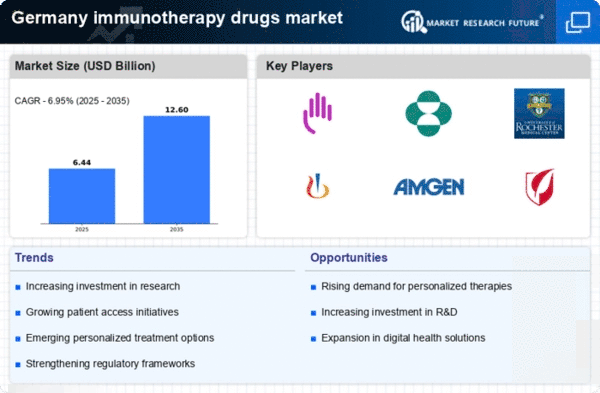Rising Cancer Incidence
The increasing incidence of cancer in Germany is a primary driver for the immunotherapy drugs market. According to recent statistics, cancer cases are projected to rise by approximately 10% over the next five years. This surge necessitates innovative treatment options, with immunotherapy emerging as a promising solution. The growing awareness among healthcare professionals and patients about the benefits of immunotherapy is likely to further propel market growth. As more patients seek effective therapies, the demand for immunotherapy drugs is expected to escalate, thereby influencing market dynamics significantly. The immunotherapy drugs market is poised to expand as healthcare systems adapt to these changing needs, focusing on advanced treatment modalities that offer improved outcomes for cancer patients.
Regulatory Framework Enhancements
Enhancements in the regulatory framework surrounding drug approvals are positively impacting the immunotherapy drugs market. In Germany, regulatory bodies are streamlining the approval process for innovative therapies, which is likely to expedite the entry of new immunotherapeutic agents into the market. Recent reforms have focused on reducing bureaucratic hurdles, thereby encouraging pharmaceutical companies to invest in research and development. The immunotherapy drugs market stands to benefit from these changes, as faster approvals can lead to quicker patient access to cutting-edge treatments. This regulatory support not only fosters innovation but also enhances competition among drug manufacturers, ultimately benefiting patients through a wider array of treatment options.
Increased Funding for Cancer Research
In Germany, increased funding for cancer research is a crucial driver for the immunotherapy drugs market. Government initiatives and private investments have led to a substantial rise in research budgets, with funding levels reaching approximately €1 billion annually. This financial support facilitates the exploration of novel immunotherapeutic approaches, fostering collaboration between academic institutions and pharmaceutical companies. As a result, the immunotherapy drugs market is likely to experience accelerated growth, with more clinical trials and studies being conducted. The emphasis on research not only enhances the understanding of cancer biology but also promotes the development of targeted therapies, ultimately improving patient outcomes and expanding treatment options.
Growing Patient Awareness and Advocacy
Growing patient awareness and advocacy for cancer treatment options is significantly influencing the immunotherapy drugs market. In Germany, patient organizations and advocacy groups are increasingly educating the public about the benefits of immunotherapy. This heightened awareness is leading to greater demand for these therapies, as patients actively seek out information and treatment alternatives. The immunotherapy drugs market is responding to this trend by enhancing marketing efforts and providing educational resources. As patients become more informed, they are more likely to discuss immunotherapy options with their healthcare providers, potentially increasing the adoption of these innovative treatments. This shift in patient behavior is expected to drive market growth in the coming years.
Technological Advancements in Drug Development
Technological advancements in drug development are significantly impacting the immunotherapy drugs market. Innovations such as artificial intelligence and machine learning are streamlining the drug discovery process, reducing timeframes and costs. In Germany, the integration of these technologies has led to a more efficient identification of potential immunotherapeutic agents. Furthermore, the development of novel delivery systems enhances the efficacy of existing therapies. As a result, the immunotherapy drugs market is witnessing a surge in new product launches, with several therapies entering clinical trials. This trend indicates a robust pipeline of innovative treatments that could reshape the landscape of cancer therapy in Germany, ultimately benefiting patients and healthcare providers alike.
















